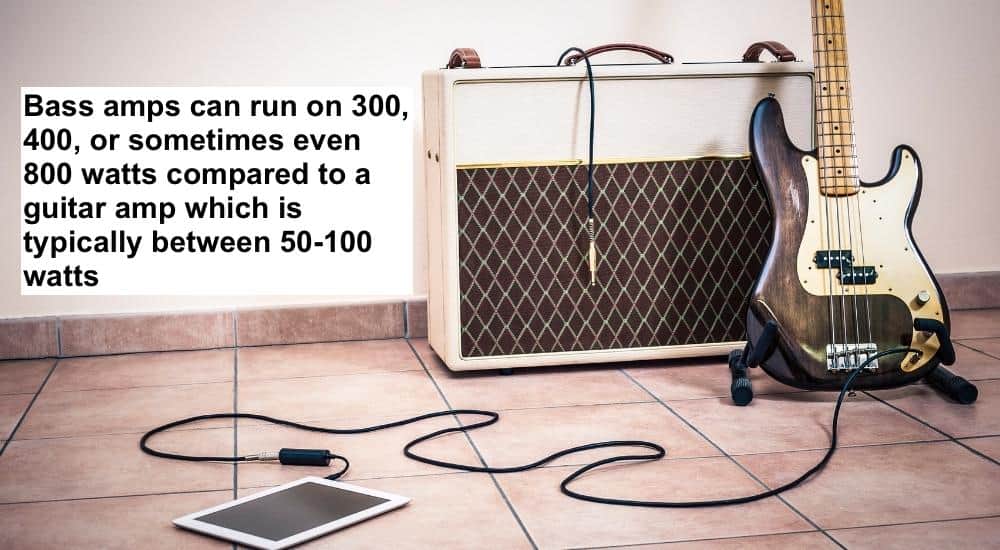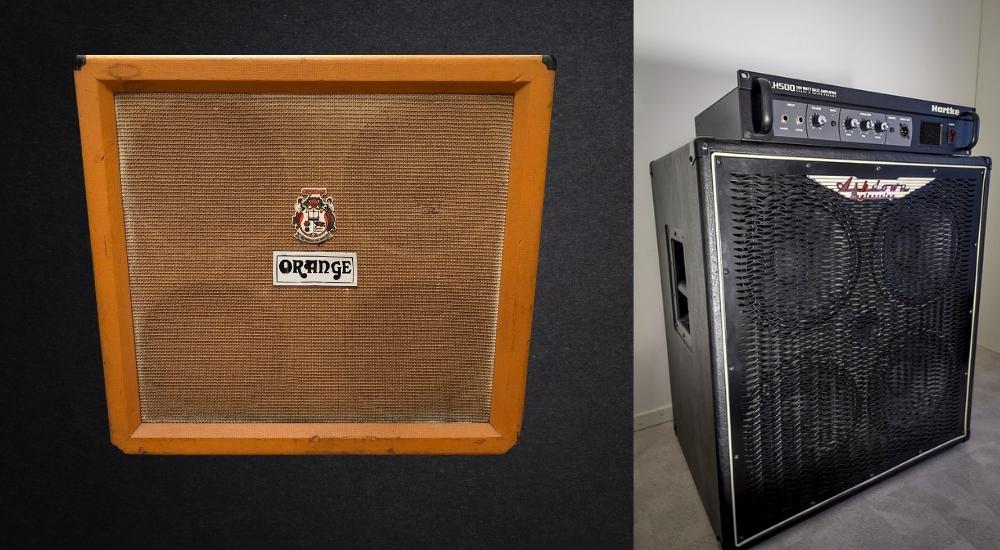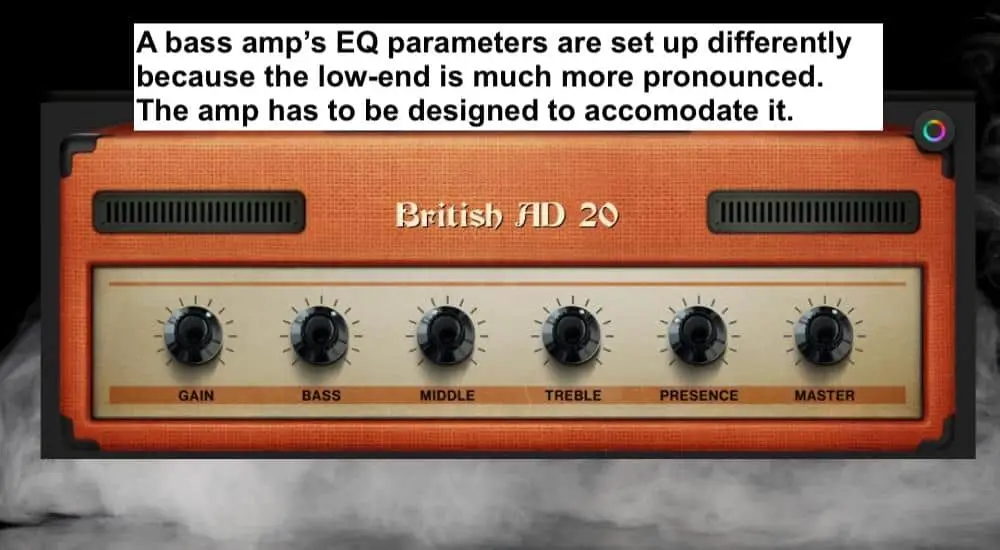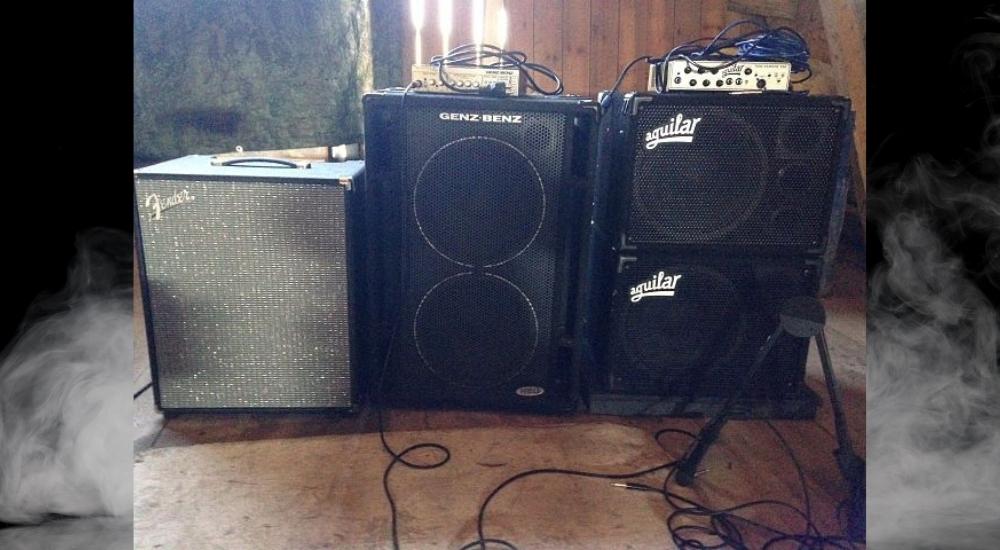Because the bass guitar and standard electric guitar are so similar to each other and many of the accessories are interchangeable, a lot of users wonder if one can use a bass guitar with a guitar amp or an electric guitar with a bass amp.
While it’s possible to swap out some of this gear, there are noticeable differences between guitar amps and bass amps, to the point where a degree of caution is needed, otherwise, you could blow a speaker and then have to buy a new one.
The main difference between a bass and guitar amplifier is that bass amps tend to have larger speakers and increased low-end frequency response, compared to guitar amps which emphasize higher-end frequencies. The result of this is an increased need for power considering they have to push more air.
All-in-all, bass amps are dealing with much lower and heavier frequencies and a result of this is an increased need for power and capability considering more air needs to be pushed. Also, low-end frequencies tend to be much louder and more noticeable to the human ear because more energy is being transmitted.
How Guitar And Bass Amps Are Different
To put it simply, guitar and bass amps are different in three fundamental ways. A bass amplifier tends to have more power, larger speakers, the entire unit is bigger, and the EQ optimization is fundamentally different as well as it’s more suited for low-end frequencies. This isn’t just pseudoscience either. For this article, I actually reached out to a Fender representative and asked them what the difference was, and here is what he had to say:
Hello,
Thanks for reaching out. The main differences are the following:
Power rating, speaker configuration, EQ optimization.
Bass amps are pushing much lower frequencies and require more clean headroom. As a result, they need more power and need to push more air. It’s not unusual for bass amps to be 300, 400 or even 800 watts and run 15″ speakers or multiple 10″ speakers ( a 4×10 is very popular).
Guitar amps on the other hand, are more mid/hi range and need to break up a little when turned up. They are usually 50 to 100 watts maximum and will typically use one or two 10″ or 12″ speakers.
You could use either for either, but it’s certainly not optimal.
Hope this helps.
Regards,
Brett Arney
Consumer Relations Manager|Fender Musical Instruments
Let’s explore what some of the information above means.
That should give you an idea of what the primary differences are, however, I think each feature are worth exploring on their own so let’s do that now.
The Differences Between Guitar and Bass Amps
1) Bass Amps Have More Power to Move More Air

Guitar amps, modelers (my guide on those), and bass amplifiers are constructed in a similar way and often share similar controls.
Moreover, both types of amplifiers have the same goal: to add volume to an otherwise quiet sound. For the most part, the bass guitar is an instrument with much lower frequencies, and thus, needs more power to move the air.
Simply put, bass amplifiers have more power, mostly as a consequence of the larger speakers as well as the wattage, which is a necessary component of transmitting bass frequencies.
If you’ll recall what the Fender said a moment ago, bass amplifiers commonly have 300, 400, or even 800 watts. As a matter of fact, you’ll see an image down below on the right with a bass guitar amp that has a 500-watt head.
2) Bass Amp Speakers Are Larger Than Guitar Amp Speakers

Bass amplifiers need larger speakers as well as more power to properly transmit the sound, although, there are some cases where bass amplifiers have small speakers and work just fine.
Larger speakers and more power are ideal for the bass guitar because the notes are much lower – about an octave lower.
On the other side of the aisle, a guitar amplifier doesn’t need as big of speakers because the notes are a lot higher, so it’s mostly a function of size and cost.
There’s no need to have larger speakers in a guitar amplifier because the frequencies that are being moved are higher and not as thick.

It’s not uncommon for a bass guitar amp to have 4 10″ speakers, but sometimes they can be 15″ inch speakers.
I’ve noticed that a lot of practice bass amps also have one large speaker in it that takes up a majority of the unit, compared to guitar practice amps which seem to feature much smaller speakers.
3) Bass Guitar Amps Have Different EQ Settings

Moreover, both types of amplifiers and speakers have their very own sound, for instance, a guitar amplifier’s idea of the “mid” tone control or the “low” tone control is different from that of bass due to the change in the EQ optimization.
A guitar’s amplifier might have its bass frequencies around 200Hz, whereas, on a bass amp, the amplifier might be lower than that, around the sub-frequency range of 80Hz. The reason why these amplifiers are constructed in this way tends to be because of the fact a bass guitar is not a high-frequency instrument.
Higher-frequency instruments tend to be for lead purposes, rather than rhythm. The guitar isn’t a low-end instrument either, therefore, manufacturers create their products in such a way so that the respective instrument can perform its function well.
4) Bass Amplifiers Are Also Bigger Than Guitar Amps

Bass amplifiers tend to look a bit different as well as a consequence of the larger speakers. In my personal experience, I would say that bass guitar amplifiers tend to be a bit taller on average to compensate for the larger speaker.
Can You Use A Guitar Amp For Bass?
With all that said, many people wonder whether or not a guitar amplifier has the ability to support a bass guitar or vice versa. Nowadays, there shouldn’t be a problem, including tube amplifiers for guitars. Speakers and amplifiers are typically constructed so as to prevent destruction or damage.
However, it’s not uncommon for guitar amplifiers to come with a high-pass filter, which means that the lower frequencies are removed immediately, and the higher frequencies are allowed to pass through. So, if you play the bass guitar through an amp such as this, it might sound a bit thin and treble-y.
But that said, there shouldn’t be an issue playing the bass guitar through a guitar amplifier. It’s just that the bass guitar is typically an octave lower than a regular guitar, although, it’s definitely a possibility to blow the speaker if you’re playing at high volumes.
The higher notes of a guitar aren’t capable of actually hurting a bass amplifier, even if it’s constructed in a way where it’s not specifically designed for higher notes.
There shouldn’t be an issue in this case, although, the other way around could be destructive. Very low bass tones could damage a speaker and amplifier that isn’t made for it.
It would probably have to be a much older bass/guitar amplifier for this to happen, especially if you’re playing at low volumes. If you were to play a show with a bass guitar through a guitar amplifier, there would likely be some problems. Check out the YouTube video below to hear my explanation:
YouTube Video Tutorial
In conclusion, the main difference between a guitar and bass amplifier is that bass amps tend to have more power in watts, larger speakers, as well as different EQ optimization.
As our representative mentioned above, you can use either amplifier for either instrument, however, it wouldn’t be the best choice.
If you’re just messing around at home with your bass guitar through a guitar amplifier, you don’t have to worry about blowing your speakers or anything like that, but when it comes time to play a show where you’ll need a lot of volume, it’s best to have a proper bass amplifier to make sure everything is sounding good.
Important Things to Note About Guitar and Bass Amps
1) Active Pickups Make A Difference
As an important caveat, if your bass guitar is active, which means that the pick-ups are powered with a battery, things are a bit different. You can’t have your active pick-ups on your bass guitar cranked through a guitar amplifier.
While it probably won’t blow the speaker (unless you’re playing at a really high volume), due to the things I mentioned earlier, it probably won’t sound good either even if you’ve made the best melody using my guide.
2) You Don’t Want A Distorted Signal While Playing A Bass through A Guitar Amp
Moreover, it’s worth mentioning that if you’re playing the bass guitar through a guitar amplifier, you don’t want the signal to be distorted at all.
A distorted signal on a bass guitar through an amplifier – barring any use of FX or distortion pedals – means that there is some damage being done to the speaker.
3) Playing A Bass Through A Guitar Amplifier Can Work Fine In The Short Term
There really isn’t much of a reason to play the guitar through a bass amplifier, because usually, a bass guitar amplifier doesn’t have many effects or anything that makes it suitable. However, if you really need to do it for a few days, it won’t be a problem, it’s just not that optimal.

 Written By :
Written By :
